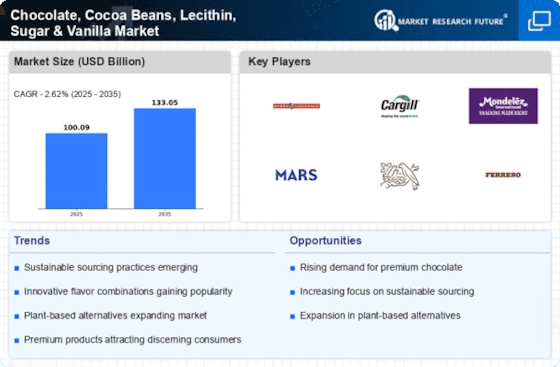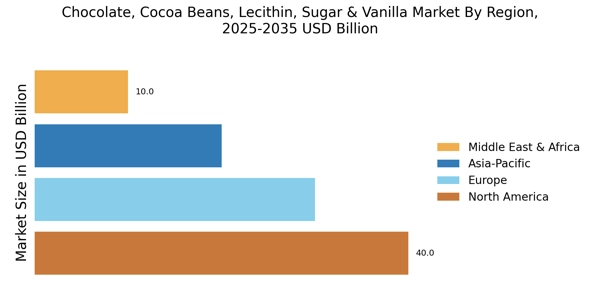E-Commerce Expansion
The rapid expansion of e-commerce platforms is significantly transforming the chocolate, Cocoa Beans, Lecithin, Sugar & Vanilla Market. With the proliferation of online shopping, consumers now have unprecedented access to a diverse range of chocolate products, including artisanal and niche offerings that may not be available in traditional retail outlets. This shift is supported by data indicating that online sales of chocolate products have seen substantial growth, driven by convenience and the ability to compare products easily. Additionally, the rise of subscription services for chocolate delivery has further fueled this trend, catering to consumers' desire for unique and personalized experiences. As e-commerce continues to evolve, it is likely to play an increasingly vital role in shaping consumer behavior and preferences within the industry.
Health-Conscious Choices
The increasing awareness of health and wellness among consumers appears to be a pivotal driver in the Chocolate, Cocoa Beans, Lecithin, Sugar & Vanilla Market. As individuals become more health-conscious, there is a noticeable shift towards products that offer functional benefits, such as dark chocolate with high cocoa content, which is often perceived as a healthier alternative. This trend is supported by data indicating that the demand for sugar-free and low-calorie chocolate products has surged, reflecting a broader inclination towards healthier indulgences. Furthermore, the incorporation of natural ingredients, such as organic cocoa and lecithin, aligns with consumer preferences for clean-label products. Consequently, manufacturers are increasingly reformulating their offerings to cater to this health-oriented demographic, thereby driving growth within the industry.
Rising Disposable Income
Rising disposable income levels in various regions are contributing to the growth of the Chocolate, Cocoa Beans, Lecithin, Sugar & Vanilla Market. As consumers experience increased financial flexibility, they are more willing to indulge in premium chocolate products, which often command higher price points. This trend is particularly pronounced in emerging markets, where a burgeoning middle class is driving demand for luxury and gourmet chocolate offerings. Data suggests that the premium chocolate segment is expected to witness robust growth, as consumers seek high-quality ingredients and unique experiences. Additionally, the willingness to spend on artisanal and handcrafted chocolates reflects a broader trend towards experiential consumption. Consequently, the industry's growth trajectory appears to be closely linked to economic factors influencing consumer spending habits.
Innovative Product Development
Innovation in product development is a key driver in the Chocolate, Cocoa Beans, Lecithin, Sugar & Vanilla Market. Manufacturers are increasingly experimenting with new flavors, textures, and formulations to attract a diverse consumer base. This trend is particularly evident in the introduction of unique flavor combinations, such as spicy chocolate or fruit-infused varieties, which cater to adventurous palates. Furthermore, the development of plant-based and vegan chocolate options reflects a growing demand for inclusivity in dietary preferences. Data indicates that the market for vegan chocolate has expanded significantly, suggesting a shift in consumer expectations. As companies continue to innovate and diversify their product lines, they are likely to capture new market segments and enhance their competitive positioning.
Sustainability and Ethical Sourcing
Sustainability and ethical sourcing have emerged as critical considerations for consumers in the Chocolate, Cocoa Beans, Lecithin, Sugar & Vanilla Market. As awareness of environmental issues and social responsibility grows, consumers are more inclined to support brands that prioritize sustainable practices. This trend is evidenced by the rising demand for certified fair-trade cocoa and organic ingredients, which not only appeal to ethical consumers but also enhance brand loyalty. Data suggests that companies adopting sustainable sourcing strategies may experience a competitive advantage, as consumers increasingly seek transparency in the supply chain. Moreover, initiatives aimed at reducing the carbon footprint of chocolate production are gaining traction, further influencing purchasing decisions. Thus, the industry's shift towards sustainability is likely to shape its future trajectory.


















